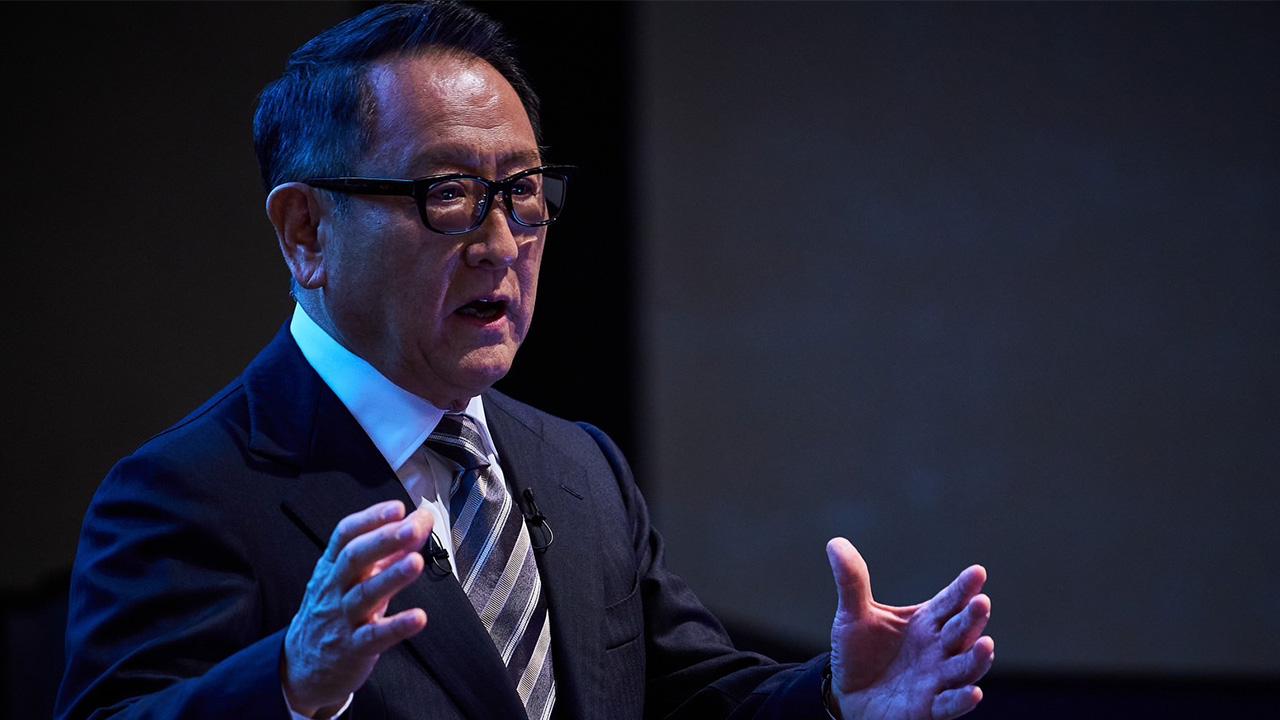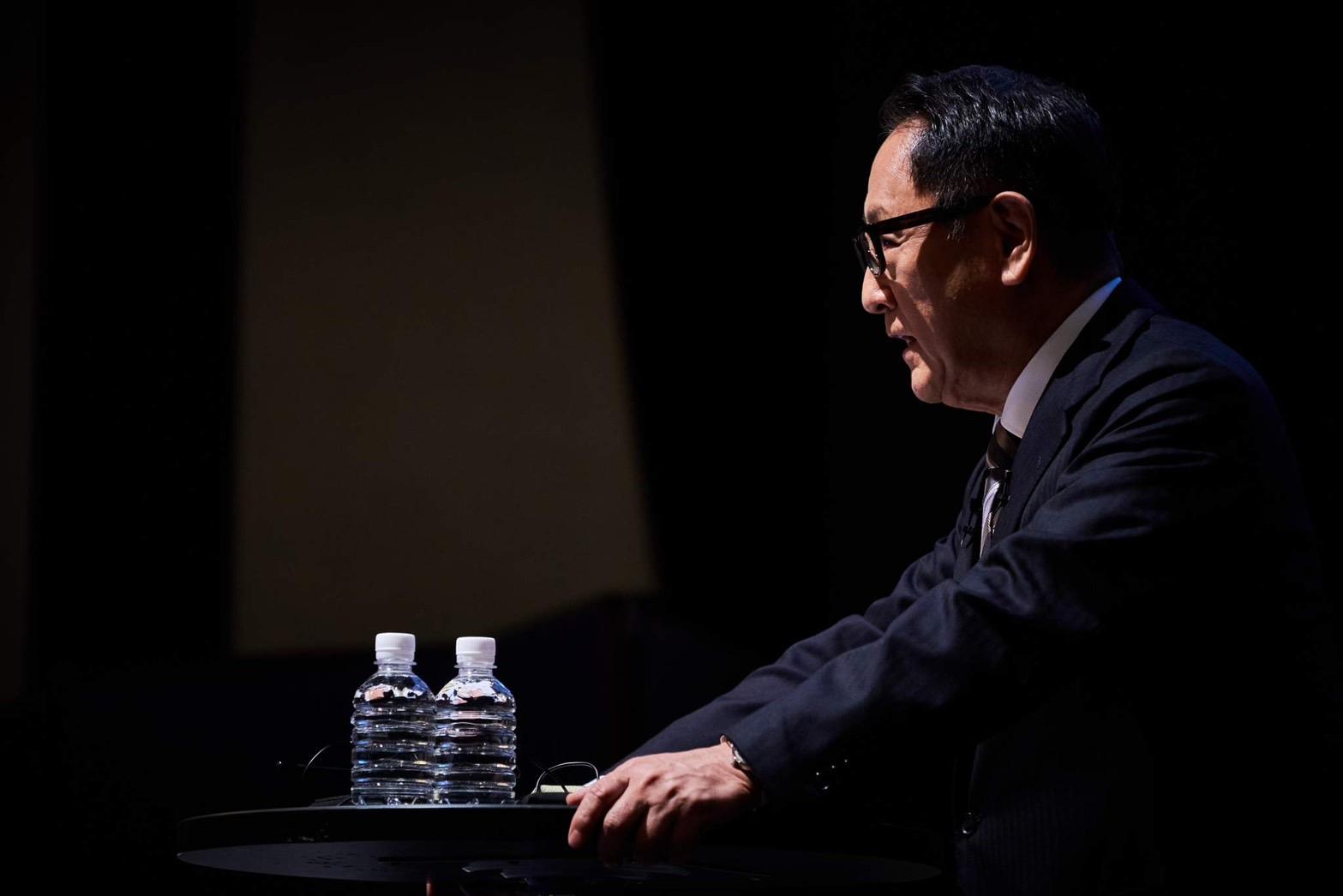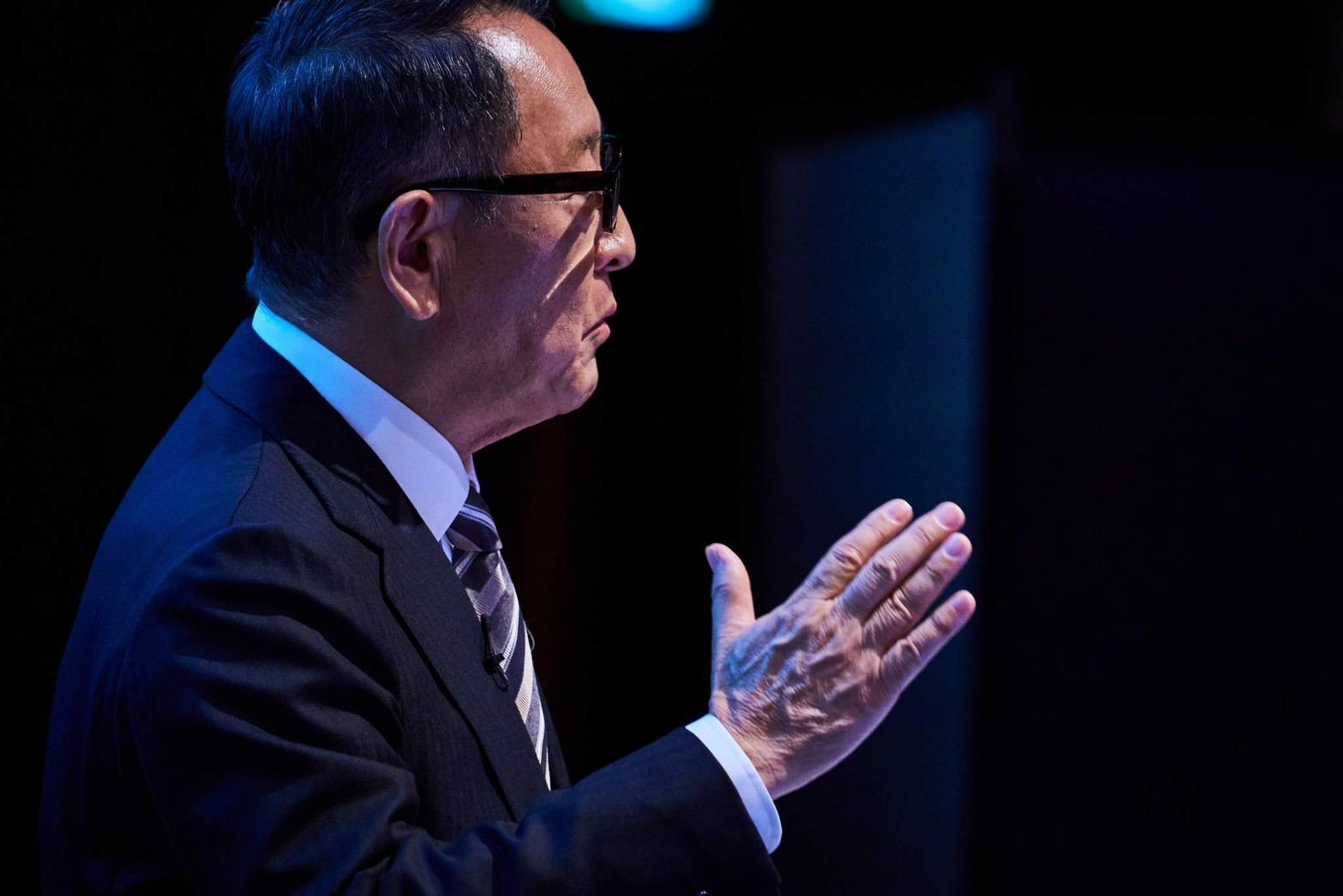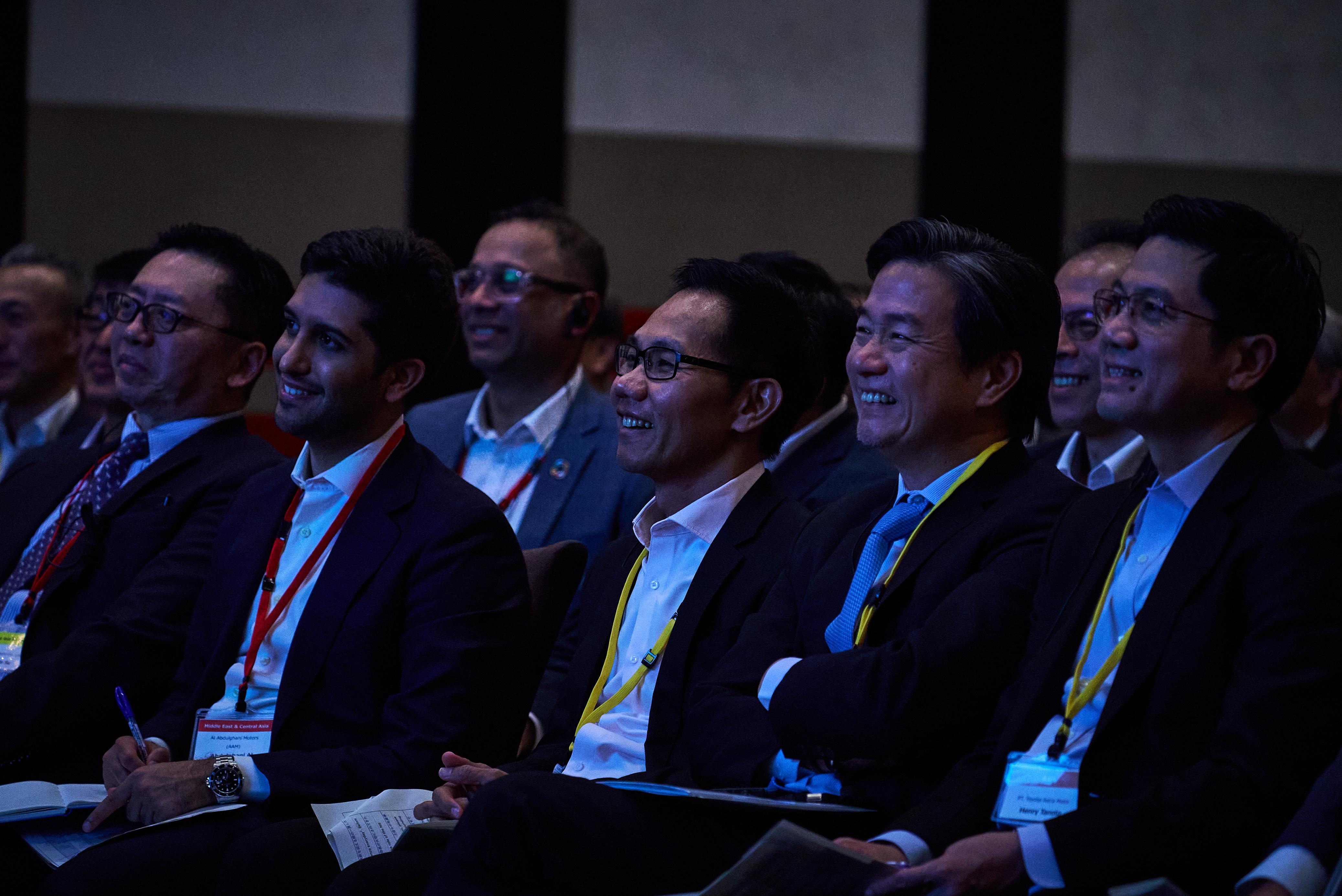
Akio Toyoda talks about his concerns and conduct during 14 years as president, along with what comes next.
I resolved not to give up on anyone the way people gave up on me.
Q11. In the past, you have decided to close a plant for the sake of the next generation. But you still offered warm comments to genba workers. What is the source of this strength and kindness?
In a word, love. It’s all based on love. Even at the public hearings, there was love for Toyota, and I managed to pull through because there were people who felt it and supported me.
Q12. I believe you made the decision to end production to protect employees, stakeholders, and the brand. What are the ideals that you refuse to compromise?
It was tough. My most important consideration was love for cars and fairness.
Although we sell cars all around the world, production and development are limited to a few regions. No matter where our cars are produced and developed, to be fair to customers, I think we need a “Made by Toyota” mindset.
I think it is Made by Toyota in XX region. I want to stick with Made by Toyota.
Q13. What is the key to making swift decisions?
Being the one responsible. I’m prepared to take responsibility so I can decide quickly.
If I weren’t prepared to do that and instead held others accountable, the decisions wouldn't have been made. At the public hearings, I was even ready to step down.
Q14. I heard that, prior to the public hearings, you made it your job to smile once a day. What are your habits or mindset when heading into big decisions?
The public hearings were the first time I felt I could serve Toyota. My presidency might end, but I was pleased to be doing something that Toyota needed of me.
All my life, I had constantly been labeled: “you’re different” or “you can’t do it.”
It may be over-the-top but I want to finish my life smiling, so I smile every day. I figured that if I was going to step down, I should go out smiling.
But as I lay in bed, my head filled with questions that would be asked at the hearing. When I came up with good answers, I wrote them down on a notepad and took those notes with me when the time came.
I think the smiling is what got me across the line. I refused to say I wouldn’t take responsibility because I didn’t know.
Personally, I was cast aside many times by Toyota. As president, I resolved not to give up on anyone the way people gave up on me.
Q15. What is the leader’s role in responding to crisis, and what have you seen as important?
Determination, resolve, and responsibility.
Q16. In responding to the flooding in South Africa, what circumstances or experiences led you to prioritize (1) employee safety, (2) recovery of the surrounding area, and (3) your own production business?
That is standard operation. This is the order in which we respond to any crisis, not flooding specifically. Before that, the first step is to confirm the facts.
However, since bottom-up fact-checking may yield subjective information, I entrust this job to people I can rely on beyond the organization.
If you have the facts, you can take steps to respond. This makes it easier for the people on the ground to act. Ensure safety and restore the surrounding area, and only then do we resume production.

Q17. When it comes to bad news linked to a crisis, has the information gap between what comes from the company and the outside world improved?
This is still a problem. It hasn’t changed. Back then, there was a gap of around three months between the U.S. and Japan, and a similar one exists today.
Recently, however, the frequency of communication has changed, not least at the top. The pandemic brought people together online, meaning that a certain amount of up-to-date information comes through and speeds up the initial response. But I don’t know how quickly it reaches the top.
Q18. In 2021, for the first time, Toyota claimed the top share of the U.S. market. Unlike a decade earlier when you overtook Ford, there was no negative press. How do you think things have changed in the past 10 years?
In the past, our announcements made it seem as though Toyota only cared about its own interests. Now, we make an effort to check the pulse by going around to each state and talking with dealers daily (so we can notice if something is wrong). We have a system that allows us to discuss concerns, not simply sales figures.
I believe there was no bashing this time because we have built a culture that ensures Toyota is not only looking out for itself. In this regard, I want to thank Toyota North America.
Q19. What do you expect of independent partners?
A dialogue with me. I think both sides should make efforts to communicate directly without middle management stuck in between.
Q20. How should you engage with countries that seek to attract Toyota’s business?
The crucial question is, “Who is this for?”
Boosting the prestige of politicians is not among our priorities. I spent 14 years returning authority back to the genba, and I hope that is the kind of company Toyota will continue to be.
Rather than being swayed by political pressure, it is about creating more jobs, returning money back to stakeholders, the lifestyles of users, and achieving mobility for all through Toyota’s new offerings.
I fear Toyota will go back to being an ordinary company. When that fear spreads, it will be too late.
Q21. In India, some people say, "We don't need Toyota—when it comes to Japan’s auto industry, we can talk with Osamu Suzuki." What is important in building relationships?
Firstly, it is to have an interest in what Mr. Osamu Suzuki has done. He has accomplished a great deal and built trust. That’s why his message resonates with others, and when he decides to act, things move swiftly. Without that, it’s naïve to think you can achieve what Osamu does.
Q22. In relationships with stakeholders, how do you handle interests that conflict in the short term?
I don’t know whether it is short or long-term, but I haven’t experienced many opposing interests.
Take, for example, suppliers who want to sell at higher prices and Toyota, which wants to buy cheaper parts. You would call that a conflict, but they have a shared base in wanting to make better cars.
What matters is the product’s attractiveness, quality, and reasonable price. Not seeking to sell high or buy cheaply but at fair prices. Toyota is a B to C company, so the burden ultimately lands on customers. If you discuss what is appropriate from the customer’s perspective, there shouldn’t be any competing interests. You need to consider the objective.

Q23. Personnel exchanges with other industries are becoming more widespread. What can you do to help people understand Toyota’s corporate culture and work together to contribute to the company's growth?
I think it’s about respecting the other side and having an interest in their company culture. Mutual interest is how a conversation starts.
No single company can create the future, nor any single industry. The moment you set out to create the future together, to change the future through cars, you need to get other industries involved, and that’s how it takes shape.
Q24. Having watched China for many years, do you have any tips for deepening ties without creating conflict?
It is to love China.
Q25. When you think of working for someone other than yourself, how do you envision that on a vast scale, for example, the 67 million people of Thailand?
It is to love Thailand. You can’t do it without love.
Q26. What would you like the next generation of overseas leaders to be conscious of?
How are the grown-ups of today acting? Before talking about the next generation, we need to understand that children only emulate their parents. If those parents work for the future and show how to act for the benefit of someone other than yourself, the next generation will follow suit.
By contrast, if today’s adults are concerned only with themselves and their own opinions, trying to show how great they are, then the next generation of leaders will surely be the same. I have seen such leaders myself.
I want to make up for the disappointments of the company’s founding members. You might think this is because I am from the founding family, yet I am not just talking about the founder but the entire founding cohort.
Cars are not made by a single person, and Kiichiro was also not alone. We reward those companions. Toyota is not a one-man show but everyone's company. I think it’s important to create an atmosphere that avoids such misunderstandings.
I constantly fear that Toyota will go back to being an ordinary company. When that fear spreads to many people, it will be too late.
Even with the title of president, it took me 14 years to change Toyota, but things could revert in a flash.
Q27. A Toyota academy was opened in South Africa as part of efforts to nurture talent and train workers in developing nations. Please share any training approaches that you have found interesting.
You should visit the Toyota Academy in Japan (Toyota Technical Skills Academy). Their activities include digging for potatoes in Hokkaido, community cleanups, and life skills education.
Alongside knowledge and skills, we want to prioritize growth as people. Learning through formative experiences, not a curriculum. Rather than simulated seminars, they start by trying to engage the people with whom they will actually work.
Q28. If you could send a message to your younger self, what advice would you give?
“Still getting picked on? You know there are many on your side, too?” That’s because I’ve been bullied all my life. I want to tell my younger self, “Don’t give up. You have friends.”
Q29. Under your management concept of “producing happiness for all,” what was your perspective for evaluating and nurturing the next crop of leaders?
You can try to answer that one for yourselves. (audience laughs)

Q30. Why do you spend so much time and effort sharing your insights in this way?
If I leave it to others, they don't manage to get my personal side across. That’s why I have always tried to make time for these sessions.
I’m not asking for sympathy, but today was actually my only day off for some time. It’s been quite a hard road, and I needed a day to rest.
But I’m doing this because you’ve all made the effort to come here. And I don’t want Toyota to turn back into an ordinary company.

